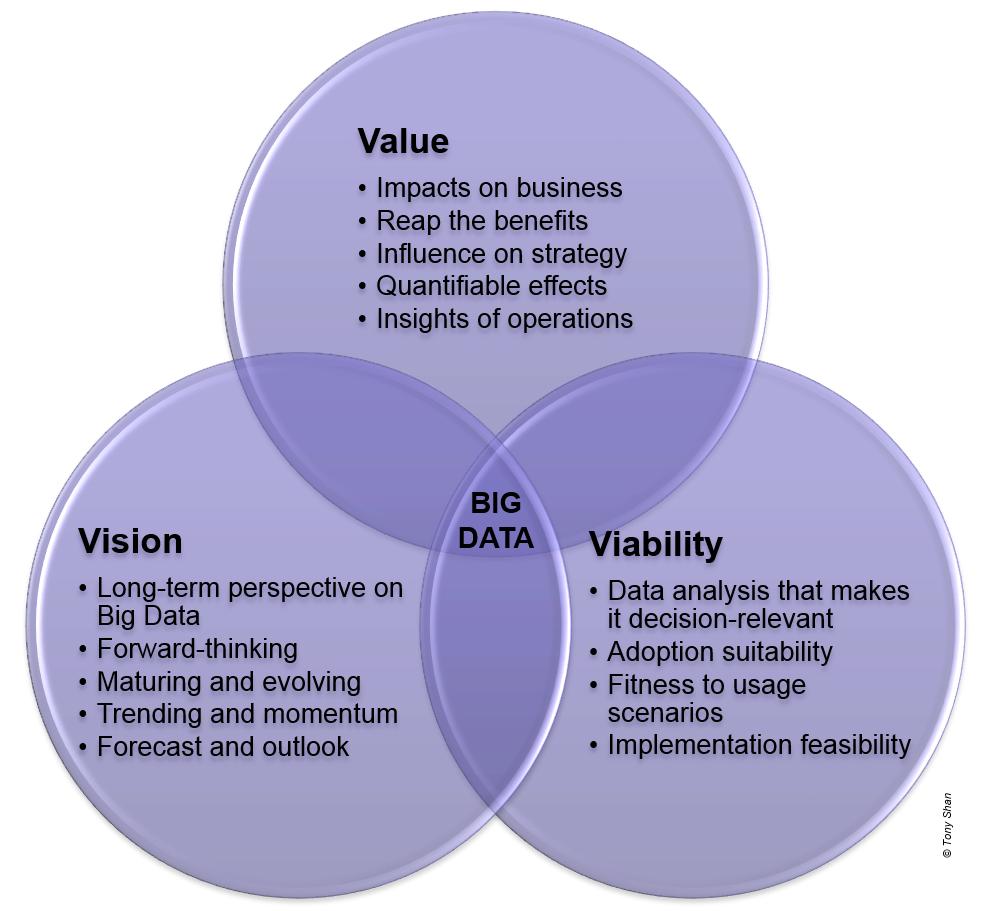Each day, we generate 328.77 million terabytes bytes of data, from various data sources, highlighting the crucial role of big data in modern business. Collecting this data in a timely manner on such a massive scale has the potential to redefine how organizations operate. However, the sheer volume of large data sets poses a formidable challenge.
Data, in its raw form, is akin to an uncut diamond. While valuable data holds promise, its true value remains unearthed without the right tools and techniques. The knowledge management process holds the key to solving this problem.
Knowledge management is more than just storing data; it embodies the essence of knowledge sharing. By ensuring that relevant information reaches the right stakeholders promptly, it allows businesses to navigate strategically.
This transformative process morphs the overwhelming data into actionable insights. It's the crucial distinction between merely owning a goldmine and possessing the expertise to extract and refine its treasures. In doing so, an effective knowledge management strategy not only amplifies productivity and fosters innovation but also empowers organizations with a distinct competitive edge, especially in realms like customer acquisition.
Yet, managing information and meshing big data with knowledge management is not straightforward—it's a multi-faceted, convoluted process. Traversing this landscape requires a profound understanding of both domains and the expertise to meld them effectively. It's essential to invest in the right knowledge management systems and platforms to facilitate this integration.
In the following article, we'll take a closer look at the intricacies involved with integrating big data with knowledge management. We'll inspect the advantages of doing so, how organizations can capitalize on all the data they collect, and the pivotal role of knowledge management platforms within this complex ecosystem.
By the end, you'll be primed to unlock your organization's data potential, steering your business toward lasting success.
What is Big Data?
Envision gathering every bit of data emanating from diverse sources such as sensors, monitors, social media, and Internet of Things (IoT) devices. Now, visualize this data, so voluminous and intricate that traditional data processing software cannot manage it. This immense data set, encompassing everything from transaction logs to tweets, is what we term "big data."

Three characteristics often define big data, also known as the three Vs:
- Volume: This refers to the astronomical data quantity, escalating exponentially year on year.
- Velocity: This points to the rapid pace at which data generation and processing occur, often in real-time.
- Variety: This signifies the diversity of data types and sources, spanning both structured and unstructured data.
What is Knowledge Management?
Knowledge management encapsulates the processes of capturing, distributing, and effectively utilizing organizational knowledge. The goal is to transform available raw data into comprehensible information which then informs valuable knowledge creation.
Here, 'knowledge' represents a blend of experience, values, expert insights, and contextual information, forming a framework for assimilating and leveraging new experiences. It's this knowledge that allows for improved decision-making and strengthens information security.
Efficient knowledge management guarantees this knowledge permeates business processes, routines, norms, and practices, leading to superior decision-making and heightened productivity.
The Role of Knowledge Management in Big Data
When knowledge management intersects with big data, a potential powerhouse emerges. Knowledge management leverages big data analytics, converting it into actionable insights to influence strategic decision-making. Big data furnishes the raw materials - the data - and knowledge management functions as the tool that excavates value from this data.
For example, in projects, unique elements present opportunities for fresh knowledge creation, with known aspects emphasizing the need for sharing crucial information. Big data can significantly contribute by offering a plethora of pertinent data from diverse sources, which can be interpreted and employed to elevate project outcomes.
Benefits of Pairing Big Data and Knowledge Management for Businesses
The union of big data and knowledge management doesn't merely offer theoretical advantages; it materializes into tangible benefits that businesses across various industries can exploit. To comprehend these substantial benefits, let's delve into some key areas through the lens of real-world business scenarios.
1. Enhanced Decision Making
Melding big data with knowledge management enriches decision-making. Businesses can harness data-driven insights and anchor their strategies on real-time information, not merely instincts or past patterns. Large-scale organizations can particularly benefit from enterprise knowledge management to facilitate decision-making at all tiers.
Imagine a retail business analyzing extensive data from sales, customer preferences, and social media interactions. With proficient knowledge management, this raw data transforms into actionable insights. The retailer could discern patterns indicating increased demand for specific products during particular periods, enabling them to customize their inventory and marketing efforts accordingly.
2. Streamlined Operations
Operational efficiency reaps significant gains from the fusion of big data and knowledge management. Big data analysis can expose bottlenecks, inefficiencies, and process gaps, while knowledge management ensures these insights are actionable. Building a knowledge management framework is crucial for achieving such operational refinement.
Consider a manufacturing firm. Analysis of production line data could reveal recurrent machinery breakdowns causing downtime. Knowledge management helps capture this information, disseminate it to the appropriate stakeholders, and use it to devise predictive maintenance schedules, thereby enhancing efficiency and reducing downtime.
3. Improved Innovation and Product Development
Big data provides businesses with deep insights into customer behavior, market trends, and competitor strategies, offering an extensive knowledge base for innovation and product development. A good place to start with this is by developing and implementing knowledge management strategies that align with your business objectives and drive innovation.
Consider a tech company designing a new software product. Big data can provide insights into trending user needs, preferred features, or common complaints about similar software. By managing this knowledge effectively, the company can leverage these insights to innovate and design a product that addresses current market demands.
4. Enhanced Customer Experience
Big data and knowledge management can dramatically enhance the customer experience. Businesses can gather and analyze data on customer behavior, preferences, and feedback. This knowledge then serves as the foundation for personalizing customer interactions, improving service, and even predicting customer needs. An efficient customer service knowledge management system can facilitate this objective.
Take, for instance, a telecom company that employs big data to analyze customer usage patterns, service calls, and feedback. Applying knowledge management practices, this invaluable data can be disseminated to customer service representatives. Thus, when a customer contacts the company, the representative possesses a comprehensive understanding of the customer's history, preferences, and potential issues, resulting in a superior, tailored customer service experience.
5. Public Sector Improvement
Big data and knowledge management can also have a profound impact on the public sector. Government agencies can analyze data from various sources to discern patterns, predict trends, and inform policy decisions.
For instance, a city's transportation department could leverage traffic and weather data to optimize public transit routes and schedules. Deploying a knowledge management system in government ensures effective utilization of these insights, improving the efficiency and effectiveness of public services.
6. Risk Management and Mitigation
One of the prime benefits of big data and knowledge management is their ability to detect potential risks and challenges. Companies can monitor extensive data in real time, enabling them to predict potential issues and respond proactively.
For instance, a financial institution could employ big data analytics to identify unusual transactions suggesting fraudulent activities. With a well-structured knowledge management system, they can rapidly spread this information across the organization to avert significant losses.
Leveraging Big Data With Knowledge Management
To effectively leverage the vast data sets available with knowledge management, there are strategic approaches that businesses must consider. These strategies, ranging from the power of AI and machine learning to data literacy, provide a comprehensive roadmap to maximize data utilization.
Let's delve deeper into each of these strategies.
1. Integration of AI and Machine Learning
In the expansive universe of big data, AI and machine learning emerge as the guiding stars. Depending on your business's data type—be it sales traffic, customer feedback, or social media interactions—you can customize a blend of AI and machine learning tools.
Here's how you can apply these advanced technologies:
- Use natural language processing to parse and interpret customer feedback, transforming subjective narratives into objective data.
- Deploy predictive analytics to foresee future sales trends, enabling proactive strategic planning.
2. Deployment of Data Visualization Tools
Data visualization tools are the Picassos of your enterprise, crafting a compelling tableau from your data. With applications like Tableau, Power BI, or Google Data Studio, you can metamorphose labyrinthine datasets into comprehensible, actionable insights.
- Develop holistic dashboards for real-time reflection of your big data insights, ensuring timely informed decision-making.
- Exploit the power of visual storytelling to effectively communicate data patterns and trends to stakeholders.
3. Establish a Centralized Knowledge Management System
A centralized knowledge management platform is your organization's expansive library, organizing and preserving knowledge for effortless access. Platforms like Helpjuice's knowledge base software can proficiently manage this library, ensuring every piece of knowledge is meticulously cataloged.
- Categorize and classify your knowledge assets based on relevance and usage, facilitating efficient knowledge retrieval.
- Ensure your system is user-friendly and readily accessible to all team members, thereby promoting a knowledge-driven culture.
4. Implement Knowledge Base Software
Implementing knowledge base software is a critical component of your knowledge management framework. It's an online repository that accumulates and displays information about a product, service, department, or topic. Tools like Helpjuice offer robust and adaptable knowledge base solutions tailored to your unique requirements.
- Employ knowledge base software to curate FAQs, how-to guides, articles, and more, serving as a one-stop solution for all queries.
- Leverage its capabilities to monitor user interactions and feedback, enabling continuous refinement of your knowledge resources.
5. Integration with Collaborative Platforms
Collaborative platforms are the bustling town squares of your organization. Applications like Microsoft Teams or Slack facilitate the sharing, discussion, and execution of big data insights, fostering a data-driven ethos.
- Frame protocols for sharing and discussing data insights, ensuring structured and effective communication.
- Encourage team members to leverage these platforms to collaborate on data-driven initiatives, promoting collective intelligence.
6. Investment in Data Literacy
Data literacy is the fertile soil where your data-driven decision-making tree thrives. It's crucial to invest resources and time in enhancing your team's data interpretation and analysis skills.
- Evaluate the current data literacy level of your team and pinpoint areas for improvement, shaping a targeted development plan.
- Arrange training sessions and workshops to bolster data literacy, empowering your team with the skills to interpret and utilize data effectively.
By optimizing these strategies, businesses can truly harness the power of big data in their knowledge management systems. The confluence of these domains paves the way for improved business processes and ensures that organizations are well-poised to extract the utmost value from the data collected. Whether it's managing information or ensuring robust information security, the synergies of big data and knowledge management are undeniable and transformative.
Guarding Against External Threats
With the increasing integration of big data and knowledge management platforms, it's crucial for organizations to be cognizant of potential external threats. As businesses delve deeper into the world of data, ensuring that sensitive information remains protected from cyber threats becomes paramount. An effective knowledge management platform not only streamlines data processes but also incorporates advanced security measures to guard against unauthorized access and potential breaches.
Wrap Up
As we navigate the intersecting world of big data and knowledge management, we find ourselves in an arena of immense opportunities. It's a place where untapped potential can be harnessed to unlock actionable insights, accelerate innovation, and establish a robust competitive advantage.
However, to truly capitalize on these opportunities, businesses require a powerful ally that can transform big data's complexity into manageable, understandable knowledge. This is where Helpjuice enters the story.
Consider the case of Entrupy, a leading authentication service provider in the luxury goods industry:
Entrupy: A Helpjuice Success Story
Entrupy, like many other companies, was navigating the complex landscape of big data. But after choosing to partner with Helpjuice, the company found itself with a tool that simplifies complex information into easy-to-understand data.
Elliot Bowman, Data Operations Lead at Entrupy, noted, "Since we started using Helpjuice, we are saving 60% of the time spent on searching using our internal dashboard." Helpjuice became their single-stop solution for data management, allowing them to look into intricate details that were not visible before.
The results were undeniable - Entrupy reported a 30% reduction in support team timings, a 40% decrease in disputes, and significant savings in tickets per month, all thanks to the information made readily available through Helpjuice.
Entrupy's success story serves as a beacon for other organizations looking to harness the power of their data and streamline knowledge management processes. It underscores the immense benefits Helpjuice can offer when incorporated into an organization's knowledge management strategy.
If you're ready to experience a similar transformation and propel your business to new heights, Helpjuice is here to help. Start a free 14-day trial today to explore how we can tailor our knowledge base solution to fit your unique business needs. Let's write your success story together.



